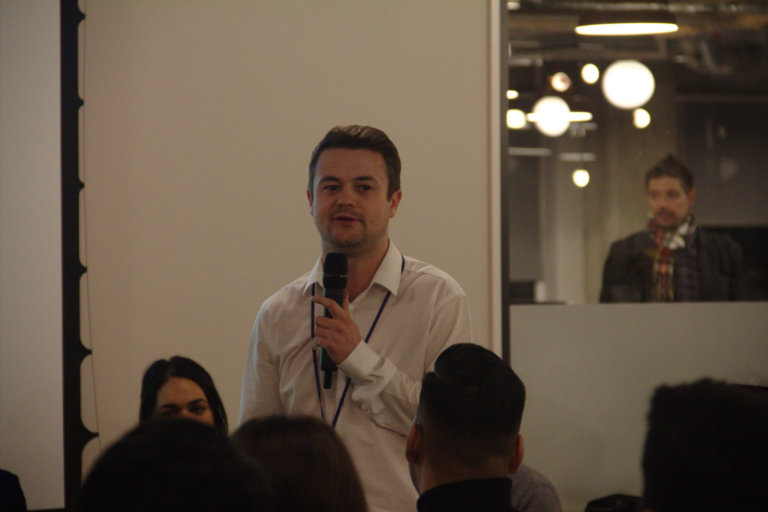
This article was written in collaboration with Capgemini. Explore exclusive graduate opportunities at Capgemini by downloading the Debut app.
Knee-deep into your graduate job applications? If you are, you’ve probably seen the phrase ‘strengths-based recruitment’ about.
On the off-chance you haven’t, you definitely will. It’s the recruitment technique being used by the biggest and best companies in the world, not only yielding employers the cream of new talent, but benefiting students too.

This is Dan Doherty. He’s a recruitment manager at Capgemini, one of the Guardian’s 300 most popular graduate employers and one of the leading technology and consulting firms on the Planet Earth.
He and a slew of expert panellists recently held a huge event at Debut HQ which saw a capacity crowd of Debutants get the lowdown on what it takes to get you through the doors at Capgemini. Swathes of students were trying to pin Dan down afterwards and get his expert advice on the process.
Not everybody could manage it, but fortunately for you, he sat down with us for 20 minutes to let us in on the secrets behind strengths-based interview success.
What is strengths-based recruitment?

As opposed to the classic competency-based questions (‘Describe a time you showed good leadership skills’ etc.), strength-based interviews are about getting to the core of the candidate, finding out their interests and seeing if they are good fit for the organisation.
“We want someone who’s fresh, hungry, and totally focused on their career,” Dan explains. “That rubs off on our clients. They like people that like what they do.”
At Capgemini, this consists of 12-15 different questions, including role motivation and company motivation questions, a presentation and a group exercise. Usually this is all done during their in-depth Assessment Centre.
That might sound intimidating but relax, it’s really quite simple and straightforward. To Dan, the goal is clear: “It’s about bringing through the best talent, not the most available talent.”
Why are companies using it?

Most job candidates are educated at university-level and pretty well qualified these days. Therefore, it’s so important to assess someone based on whether they will, uh, actually enjoy and be good at the job.
“Anybody that you hire has an element of risk.” says Dan. Strengths-based recruitment helps reduce that risk, leading to higher levels of retention. He stressed to me the particular importance of staying motivated within his organisation, a place where self-motivation and constant improvement is king.
“The culture in Capgemini is that you drive your own career. We don’t have any consumer products, so our products are our people. The more they’re upskilled and cross-skilled, the more appealing they are to our array of clients.”
If you perform well in a strengths-based interview, chances are you have these qualities already. Result! But hold off on the victory lap for a minute, ‘cos there are a couple things you need to know.
The bad news first: Your blagging days are over

Say it ain’t so, your days of raiding The Student Room are numbered. Turns out even if you do know what employers are gonna ask you in a strength-based interview, it won’t help you in the slightest.
“It’s all about your interpretation of the question,” says Dan. “If you have been working in the same line of work on your CV but you’re not passionate about it, we will be able to draw that out.” ?
One of the biggest benefits of the strengths-based method to employers is the fact that they can’t be misled as easily. It’s hard to fake genuine enthusiasm – ask anyone who’s ever watched a birthday party magician.
So, in order for you to smash your strengths-based interview, you need to demonstrate real zeal and passion for the role you’re pursuing.
The good news: it doesn’t matter what you did, it’s about what you do

Tired of applying for entry-level jobs that require at least five years of work experience? Be tired no more. Strength-based applications, in Dan’s eyes, isn’t about the amount of qualifications, grades or even what course you’ve done.
“It’s all about the way you think and feel, your approach to situations and what you would do, not what you done”, he says. “You might be a very senior experienced graduate, or you might be fresh out of uni. But you’re not at any particular advantage or disadvantage either way.”
Here’s more good news. Assessment centres have a pretty high conversion ratio. So if you make it to that point, don’t panic! Stick with what got you to the dance.
As Dan told me, “You don’t have to have excelled in every part of our assessment centre. We understand that with strengths comes weaknesses.” So whether you’re an analytical mind, a creative thinker or a natural-born leader, have faith that the interviewers will detect your talents.
Create solutions

We know, any interview can be pretty daunting. But while the strength-based way of recruitment closes some traditional approach strategy doors, it opens several others.
There’s no trick to it. But if there was, it would be to show all the different sides to your personality and, in a Capgemini sense, “Always think that you’re creating a solution to a problem. That’s what we get paid to do.”
Click here to view the career opportunities available with Capgemini.


